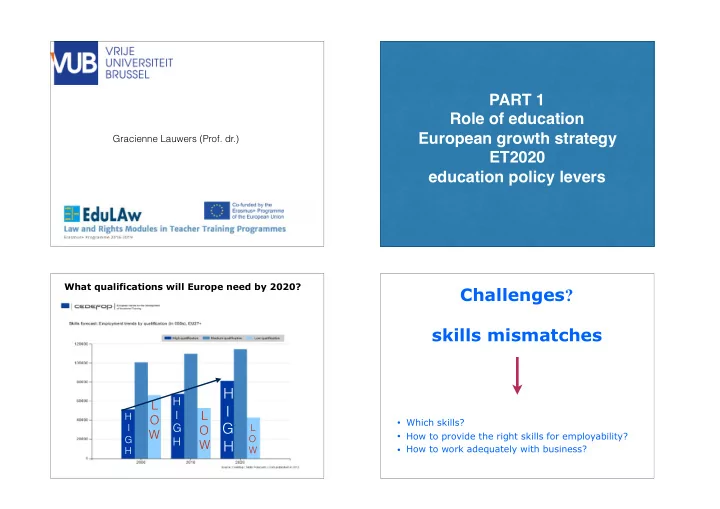

PART 1 Role of education European growth strategy Gracienne Lauwers (Prof. dr.) ET2020 education policy levers What qualifications will Europe need by 2020? Challenges ? skills mismatches H H L I I L H O • Which skills? G G I L O W • How to provide the right skills for employability? O G H W H • How to work adequately with business? W H
What to do? KEY OUTCOMES FOR EDUCATION 1. revise teaching professions 2. strengthen transversal skills (1)entrepreneurial initiative (2)digital skills (3)foreign languages 4. improve performance of students at risk of early school leaving at least 95% 5. at least 15% 3. fewer than 15% 1. rate of early 2. at least 40% (1)increasing inclusiveness participate in early in lifelong learning under-skilled leavers completed higher childhood education (2)low-skilled adults in reading, below 10% education mathematics, 4. develop world-class vocational education and training science 4. Key transversal at least 20% of higher education graduates 6. promote work based learning competences and 6% of 18-34 year-olds with an initial vocational qualification (1)quality traineeships, should have spent some time studying or training abroad (2)apprenticeships at least 82% (3)dual learning models share of employed graduates (aged 20-34 with at least upper secondary education attainment and having left education 1-3 years ago) 4. increase the efficiency of funding in education Teachers are an ageing profession in most countries Focussing on the teaching profession a priority for the next years
How to become more entrepreneurial? Key transversal competences Combine innovative pedagogies with an effective use of digital tools and content ICT skills levels vary greatly between countries ! VET, work-based learning and apprenticeships Basic skills levels are still lacking in many countries key role in tackling youth unemployment and facilitating the transition to the labour marke = linking more closely education and work
Learn foreign languages Work-Based Learning is still an exception Continued learning after initial education crucial for • raising productivity levels of working-age population • tackling skill mismatches and bottlenecks on the labour market NATIONAL education policy response: Flemish Community of Belgium Academic year 2019-2020
Why reforms were/are needed? Initial teacher training professional bachelor IMPROVING STUDENTS AIM? to improve the quality of students entering teacher education Level 6 in the Flemish Qualification Framework / EQF trained at university colleges HOW? obligatory non binding entrance exam „ strengthen the study choice not to limit the inflow ” WHY? + no students with insufficient abilities larger percentage earn a diploma more recognition for the teaching profession Critics? some students being excluded fear for a shortage of teachers, especially in urban areas IMPROVING TEACHER EDUCATION - qualitative education - qualitative research - qualitative staff - quality infrastructure Educative master Post-graduate education for secondary Level 7 Flemish Qualification Framework/EQF education university-trained teachers Level 5 Flemish Qualification Framework/EQF secondary education teachers - university trained • secondary teacher-training centers - integrated in universities / no longer exist • autonomous post-secondary non-university institutions diploma awarded equals an educative master - before specialist subject teachers • • inflow of students with a particular technical professional expertise needed a postgraduate diploma in education including a traineeship in a school courses include: • • students have a secondary education diploma and can demonstrate at least three years of useful professional experience thorough pedagogical training, • thorough didactic training, • • focus the training is solely on the basic competences of teacher large amount of practical training • • no subject content in the training program teaching of a philosophical or ideological vision on education, education law, • or other additional subjects no postgraduate training for mentors of future teachers • not any special career track for coaches or mentors of teachers • non-binding entrance examination •
1. Classroom placement PART 3 in the educative master Critical remarks about the reforms starts at master level • more collaboration • be drilled in the craft of the classroom • techniques practised, coached and relentlessly assessed 3. 2. No mentorship training of teacher training staff by outsiders No didactics on teaching common values • equality, integrity, respect for others, … • Mentoring by an outsider in particular to view the wider context of change in which teaching is operating
5. 4. No course on understanding cultures No didactics on project based learning • to teach to understand other cultures • to teach to think globally • to teach systematically problem solving using tools rather than just about the tools 6. 7. No didactics in flexible and mastery-based learning No didactics in new ways of providing teaching and providing education for adaptive-learning techniques • to cater the education to match the aptitudes and abilities of students • to make the actual classroom again a place for Socratic dialogue • the rise of artificial intelligence could transform educational practices and with adaptive learning, offering a way of doing so
8. To conclude Often no basic law course in teacher education train teachers for the world we live in, not the world we grew up in & improve good lawyer-educator collaboration
Recommend
More recommend